Minibus collecting votes set ablaze in Iran, rights groups report
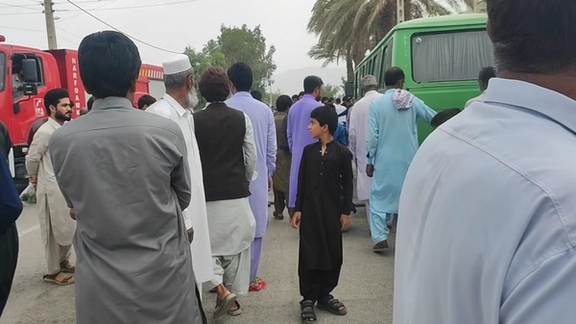
A minibus sent to collect votes from Sunni worshippers at a grand mosque in Saravan, in Iran's eastern Sistan-Baluchestan province, was set on fire, according to rights groups.

A minibus sent to collect votes from Sunni worshippers at a grand mosque in Saravan, in Iran's eastern Sistan-Baluchestan province, was set on fire, according to rights groups.
An ethnic rights advocacy group, the Baloch Campaign, reported that the bus "left the area without collecting any votes." Apparently, the blaze was put out enabling the vehicle to drive away.
This incident follows last week's violence when unidentified assailants attacked a vehicle transporting election boxes in Sistan-Baluchestan Province just minutes after voting concluded in the first round of presidential elections at midnight on June 29.
The assault reportedly resulted in the deaths of two security personnel and injuries to several others, according to Iran's state news agency IRNA. Additionally, one of the assailants was also killed.
Sistan-Baluchestan experienced significant unrest during the nationwide protests following the death of Mahsa Amini in custody, recording the highest number of casualties among Iran's 31 provinces.
The province remains a hotspot for protests fueled by unemployment, water shortages, and security policies perceived as targeting the Baluchi minority.
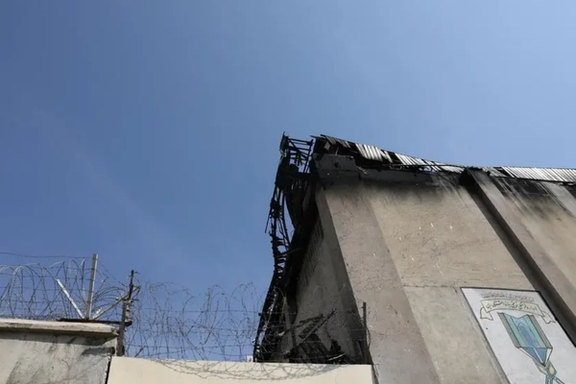
Political prisoners in Tehran’s notorious Evin Prison and Ghezel Hesar Prison in Karaj abstained from voting for the runoff presidential elections, just as they did last week.
“More than a hundred political prisoners [in Evin prison] refused to participate in this unfair and unjust process, standing firm in their pro-freedom ideals,” former political prisoner Mehdi Mahmoudian wrote on X.
Nobel Peace Prize laureate Narges Mohammadi, reformist politician Mostafa Tajzadeh, and former MP Faezeh Hashemi Rafsanjani are among the prisoners who boycotted the elections. Others include Abdollah Momeni, Mohammad Najafi, Alireza Beheshti Shirazi, Reza Shahabi, Rasoul Bodaghi, Behzad Ghorbanian Nejad, Amir Salar Davoodi, Vida Rabbani, Sepideh Gholian, Golrokh Iraee, and Maryam Yahyaavi.
In recent weeks, numerous dissidents, from those in prison to those active on social media, have publicly declared that the upcoming election is a manipulated facade rather than a genuine democratic process.
Amirsalar Davoudi, a lawyer incarcerated in Evin Prison, denounced the election as a "selection" in a letter from prison. He refused to participate, asserting that the Islamic Republic follows a path of "lies and deceit."
Former political prisoner Abolfazl Ghadiani also called for a boycott of the election. He emphasized that solving Iran's problems requires transforming the "ruling religious dictatorship" into a "democratic secular republic" through "civil and political resistance."
Ghadiani’s stance reflects a broader sentiment among activists who believe superficial electoral changes are insufficient and that only a complete overhaul of the political system can address the country's root issues.
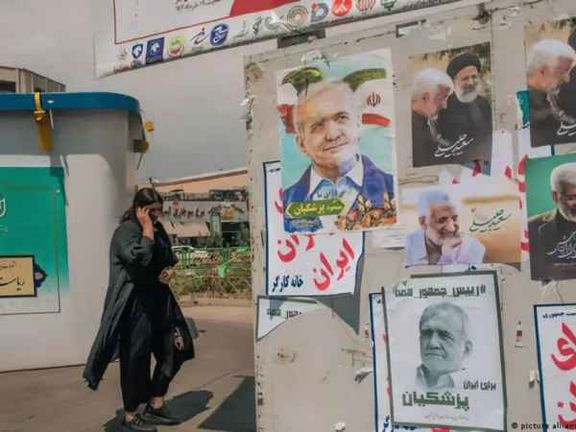
According to Iran's interior ministry, over 30 million Iranians have voted in the runoff presidential election, considerably higher that the nearly 40% participation in the first round on June 28.
Polls closed at midnight but voters queuing outside polling stations in some constituencies including Tehran were allowed to enter and wait for their votes to be taken.
As in many previous elections, many voters often turn up at polling stations in the late afternoon and evening hours to avoid the daytime heat. The interior ministry extended the voting time in three stages after 18:00 local time by two hours.
A high turnout in the later hours of the polls has usually benefitted the candidate backed by the reform faction of the Islamic Republic, in this case Masoud Pezeshkian facing hardliner Saeed Jalili.
There are no exit polls in Iran. Results are expected to be announced by morning.
None of the two candidates has claimed a major incident of vote rigging but some irregularities have been reported.
Supreme Leader Expresses Hope in High Turnout
Supreme Leader Ali Khamenei cast his vote soon after the opening of the polls. "I heard that the people's enthusiasm and interest is more than before. I hope this is true. It will be heartwarming if it is,” the 85-year-old Iranian leader who has always insisted that a high turnout is proof of the legitimacy of the Islamist government said.
Khamenei admitted in a speech Wednesday that the turnout in the first round had been “less than expected but attributed it to people’s “lack of time” rather than their disenchantment with the government and refusal to participate in its elections.
Turnout
According to the Interior Ministry over 30 million votes were cast by the official end of the polling time at midnight. Any official tally around 50% will be questioned in coming days as eyewitness reports throughout the day spoke of empty polling stations.
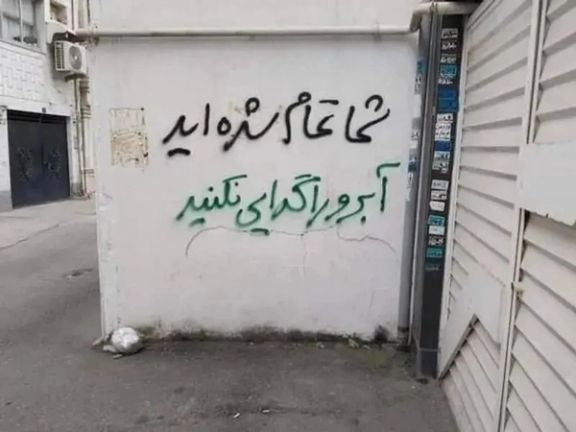
In the first round, just under 40 percent of Iran's around 61.5 million eligible voters went to the polls, casting 42.4 percent of their votes for Pezeshkian and 38.6 percent for Jalili. 4.3 percent of the remaining ballots were blank, void, or for the two other candidates.
Citizens from various cities and towns across Iran including the capital Tehran have sent dozens of videos and photos of empty polling stations to Iran International TV or posted them on social media.
Various political groups and activists as well as many ordinary Iranians, both outside and inside Iran, continued to urge the electorate to boycott the elections which they consider neither fair nor free and “engineered” to prevent Khamenei from “usurping” their participation and using it as proof of the legitimacy of his rule.
Dissidents Protests in Major Cities Across the World Outside Polling Stations
As in the first round of the elections, dissidents protested in major cities outside Iranian embassies and polling stations including in London, Stockholm, Sidney, and Bonn. Minor clashes were reported in some places between the protesters and those who had turned up to vote.
Pezeshkian Supporters Accuse Government of “Dissuading” Voters with Text Messages
Last Friday, the interior ministry sent a text message to all Iranians a few hours before the official closing of the poll in which it quoted Khamenei as saying every vote was a vote for the ruling establishment. The ministry sent this and similar text messages to all citizens in the afternoon of the runoff polls again.
Many, including former Foreign Minister Mohammad-Javad Zarif who has relentlessly campaigned for Pezeshkian, have interpreted the text message as a deterrent to the voting of those who fear their votes being used as proof of the legitimacy of the Islamic Republic.
In thinly veiled terms in a short video posted on social media Friday afternoon, Zarif referred to such messages and urged people not to be discouraged from voting by them.
Voting/Abstention of Political Figures
Former President Mohammad Khatami who is widely considered as the leader of the 'reformists' had abstained from voting in the March parliamentary elections but voted in the first round. He voted again in the runoff but refused to speak to the state television after voting.
The leader of the Green Movement Mir-Hossein Mousavi and his wife Zahra Rahnavard who have been under house arrest since 2011 refused to accept a ballot box to be taken to their home to vote. Mehdi Karrubi, also a Green Movement leader under house arrest since 2011 voted at his home and urged Iranians to vote for Pezeshkian.
Photos of former President Mahmoud Ahmadinejad who after being barred from standing in the 2017 elections has assumed the role of an opposition figure were posted on social media indicating that he was abroad and not voting. The photos that showed him at a mosque in Istanbul, Turkey, emerged on social media after an account linked to him announced Friday that he was not endorsing any of the two candidates.
As in the first round of the elections, most prominent imprisoned dissidents including the reformist Mostafa Tajzadeh and Nobel Peace Laureate Narges Mohammadi refused to vote in prison.
As in the first round, prominent political prisoners in various prisons refused to vote.
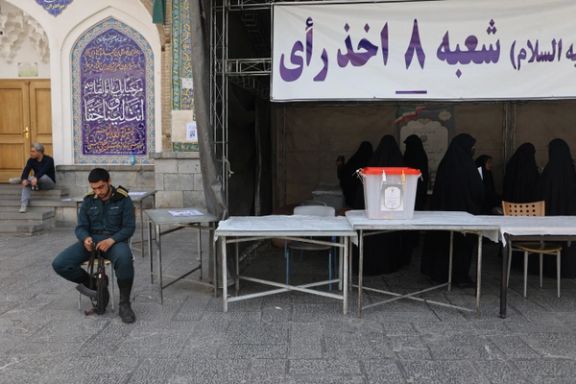
As eyewitness reports from Iran indicated many empty polling stations across the country, officials began claiming that the turnout was higher than in the first round of the election last Friday.
The first round of the snap presidential election on June 28 witnessed the lowest turnout of less than 40% in the history of Iran’s Islamic government, while the top leadership had campaigned for voter participation after a lackluster parliamentary election on March 1.
Dozens of videos on social media and several received by Iran International from citizens in Iran showed deserted polling stations in the capital, its suburbs and other cities and towns in distant provinces. Some of empty voting locations were central polling stations in Tehran.
Although some opinion surveys conducted by government-controlled media predicted a turnout of around 50% or slightly less, the videos tell a different story. Authorities will soon face a dilemma when polling stations close at midnight, and they must begin announcing results. If they report a figure lower than 40%, it will reinforce last week’s perception of a large boycott or widespread dismissal of the tightly controlled elections.
If they decide to inflate numbers, as many on social media say they expect to see, fewer citizens will believe the results and the Islamic government’s elections and legitimacy will come under more questions.
Officials extending voting beyond the official closing time of 6:00 PM, as is customary in Iran, expecting a larger turnout in the evening hours. Videos received midday showed several polling stations in Tehran, Karaj, Pardis and other locations around the capital virtually devoid of voters.
A video sent to Iran International showed just three workers in a polling station in Tehran, where the official in charge was playing the Hamster computer game.
A video published by a Baluch group showed Sunni citizens leaving the main mosque in the southeastern city of Zahedan without even stopping at the ballot boxes, which are typically brought and placed in places of worship.
Sociologist Mostafa Mehrayin wrote on X that “I can say with certainty that people’s No to the country’s current political situation was greater today than in the first round of the election.”
At least 100 political prisoners in Tehran also refused to vote when officials brought ballot boxes to penitentiaries. They had similarly boycotted the first round of voting.
Many insider politicians, mostly belonging to the ‘reformist’ faction of the Islamic Republic continued to urge people to vote. Chief among them was former foreign minister Mohammad Javad Zarif. However, dissidents and critics dismissed these calls, saying that the reformists further discredited themselves by trying to save the credibility of the Islamic Republic.
In an exclusive interview with Iran International, renowned activist Bahareh Hedayat accused the 'reformist' of abandoning the Iranian people during the presidential election and helping the government to boost turnout.
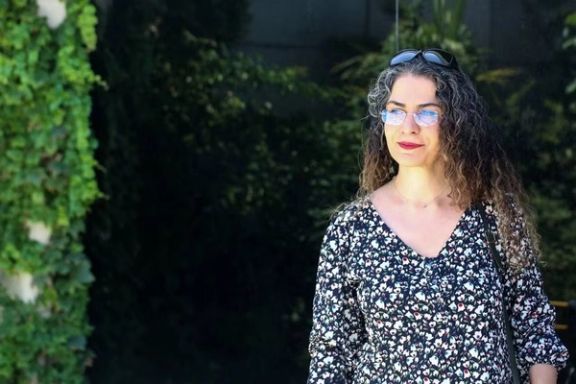
In an exclusive interview with Iran International, renowned activist Bahareh Hedayat accused the 'reformist' of abandoning the Iranian people during the presidential election and helping the government to boost turnout.
“The term 'reformist' no longer illuminates their position, and they cannot be addressed by this title because they were supposed to bring about fundamental change in the existing system, but not only have they retreated from this stance, they have also taken a conservative position and openly state that they are here for the survival of the system,” Hedayat told journalist and TV host Mehdi Mahdavi Azad.
No candidate secured a majority in last week's snap presidential election, leading to a runoff this Friday between Masoud Pezeshkian and Saeed Jalili.
With over 60% of the electorate abstaining and numerous dissidents having called for a boycott of the election, many, including Hedayat, viewed this as a victory for the Iranian people, demonstrating the state’s lack of legitimacy.
“I feel that the people spoke last week. Without access to media, their voices were directly heard,” Hedayat said, calling on others to adhere to the “people's decisive ‘no’ to the Islamic Republic”
“Not only did the intellectuals and elites not help the voices of the powerless and voiceless people of Iran to be heard but they also have not recognized the people's victory last week,” she said.
Hedayat, who began her political activism with a reformist stance in the early 2000s, has endured several years of imprisonment, including a seven-year sentence for protesting the 2009 election results. She also publicly criticized the Iranian government for the Islamic Revolutionary Guards’ downing of Ukrainian Flight PS752, receiving a four-year prison sentence for her actions.
In recent years, she has publicly shifted her political stance, advocating for the overthrow of the Islamic Republic.
The 42-year-old political prisoner, currently on temporary medical furlough, said she agreed to this interview, despite the risk of being sent back to the notorious Evin prison. In March, she revealed that doctors discovered early-stage cancer cells in her uterus following a routine gynecological visit.
"The very reason for this interview is to convey my protest to the ears of the people, in regards to the intellectuals and the elites who in these days put their efforts to back one of these [presidential] candidates,” she said.
Referring to Pezeshkian, the so-called reformist candidate, she refused to mention his name, stating, "He is that insignificant, and the issue is so absurd."
Hedayat named several individuals who reportedly participated in the election, thereby undermining the Iranian people's victory in abstaining.
"Keyvan Samimi and Alireza Rajai. A group of left and right-wing economists and other elites involved in shadowy politics in Iran have come forward and announced their support," she said, questioning, "What are you supporting, and how can you not hear the people's voices?"
Reflecting on her own past participation in elections, she stated that she understands the propaganda used to encourage voting.
Hedayat argued that the reformist movement has fundamentally failed, having either lost or never had influence, and made no progress even when they controlled the parliament and government.
“When they had the parliament and the government they couldn't take a step forward. Now, with this radical parliament, who do you want to send there to gain a vote of confidence?,” she said.
Arguing that the issue lies not in individual candidates, but in the systemic failure of the reformist project, she said “it's not that, for example, Jalili is bad, Pezeshkian is good, or Pezeshkian is bad and Jalili is worse."
Hedayat criticized Pezeshkian for his public statements of unwavering support for the Supreme Leader, questioning his credibility to advocate for protesters' rights.
According to the dissident the political landscape in Iran is fully occupied by figures like Jalili's team, leaving no space for reformists or any other forces to make an impact, and lacking the power to displace them.
"The issue is the gap that has arisen between the elites and the people who rightly and justly protest the current situation, and unfortunately, these people do not receive support from their elites," Hedayat said.
While criticizing intellectuals and elites who urged people to participate in elections, the activist emphasized that Iranian society needs to be able to “trust its elites again at critical moments, and these two must create a genuine bond so that, for once, we can take a step forward in the project of transformation or overthrow."
She warned that those opposing revolution and transformation are reigniting this discourse, effectively revitalizing the Islamic Republic despite the significant sacrifices made by the youth in recent years.
Hedayat also noted that many connected with the 1979 Islamic revolution avoid calls for overthrow due to doubts about their place in Iran's future.
While this reluctance isn't limited to them, some elites participate to maintain their status, while others are genuinely concerned about the country's future.
"I have no issue with ordinary citizens who are under pressure and might hope that the situation improves a bit; I understand that. We must accept it…We must adhere to the people's opinion and vote. Last week, people said no…We have no right to break and dissipate this mobilization and attribute this victory to the gap-openers who still carry the name of reformism. We do not have the right to do such a thing," she said.
‘The duty of intellectuals and the opposition’
In response to the question of what the duty of an intellectual is in today's Iran, she said: "The opportunity we have now and should not delay is to spread discourses. If we find existing discourses insufficient, we should create the needed discourses, with three specific dimensions that can explain the past, frame the present, and most importantly, outline a realizable vision for the future."
Referring to the narrative that the opposition lacks a clear plan and vision for overthrowing the regime and managing the aftermath of a revolution in Iran, Hedayat questioned who, other than these very elites, should determine that path.
“They are showing that at this critical moment, for various reasons, they fear overthrowing, the absence, and the fall of the Islamic Republic," she said.
She stated that while many intellectuals critically view the monarchy movement, it is essential to acknowledge its presence and influence.
Hedayat emphasized that to develop a discourse that moves beyond the current situation, it is necessary to recognize and accept the monarchy movement as a significant part of the existing reality on the ground. Only by doing so, she argues, can a more effective and inclusive discourse be created.
She explained that the current efforts are focused on the "duality" between the monarchist front and a fragmented, anti-Pahlavi opposition, which has worn out the opposition and disheartened the people.
The dissident noted that while criticisms are not solely directed at anti-Pahlavis, the actions and behavior of monarchy supporters show they "do not intend to recognize the other side at all," contributing to the lack of recognition and unity within the opposition.
She concluded the interview by addressing both the participation of intellectuals in the "disgraceful election" and the resulting despair within the opposition.
Despite internal disputes and setbacks, Hedayat emphasized that the people's refusal to participate in the election last Friday is a valuable asset that the opposition must leverage.
She asserted that the majority of the Iranian people will persist in their acts of resistance, including reaffirming their “victory” by abstaining in Friday's runoff election.
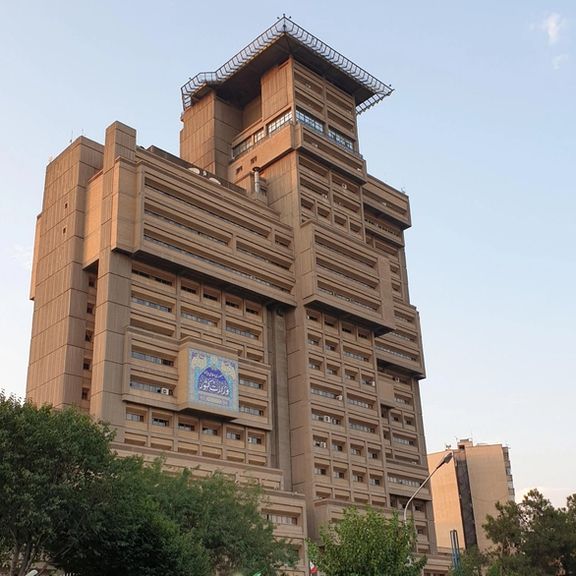
Some former and current officials and politicians have criticized the Interior Ministry for sending text messages urging citizens to vote in the presidential election, arguing that these messages are counterproductive and may actually lower turnout.
Their criticism implicitly acknowledges that many who do not support the Islamic Republic will be turned off from voting.
An example of the Ministry's messages blamed by officials includes: “Supreme Leader: those who love Islam and the Islamic Republic should vote.”
Mohammad-Javad Azari-Jahromi, who served as the Minister of Communications in Hassan Rouhani's government, quoted Supreme Leader Ali Khamenei in a tweet, saying, “Even the people who don’t believe in the establishment, should vote,” adding, “For Interior Ministry’s information.”
Azari-Jahromi criticized this approach, tweeting, "Mass messaging should aim to increase participation, not decrease it!"
Ali Gholhaki, a journalist close to Iran's hardliners, wrote on X: “One of the surveys explicitly states that 'text messages from the Ministry of Interior' have had a negative effect (albeit a small one). So, please don't send text messages! Those who are committed to vote don't care about your messages; those who are undecided become more uncertain because of them!”
Reformist political activist Rahmatollah Bigdeli didn't hold back his criticism of the Ministry's messages. In a plea on X, he wrote, "Dear Ministry of Interior, if you truly want broad public participation in the elections, please stop encouraging people to vote! If you don't invite people, participation will definitely be higher! Please stop sending text messages!"
Reformist activist Emad al-Din Baghi highlighted the significant impact of the Ministry's messages. He recounted the experience of a local shopkeeper who had initially planned to vote at 6 o'clock but changed his mind after receiving a message from the Ministry of Interior that tied voting to support for the establishment. Baghi emphasized, “The votes of millions of citizens are for determining their own and their country's future, not for supporting the system. Do not tie the right to vote to your policies or the regime.”